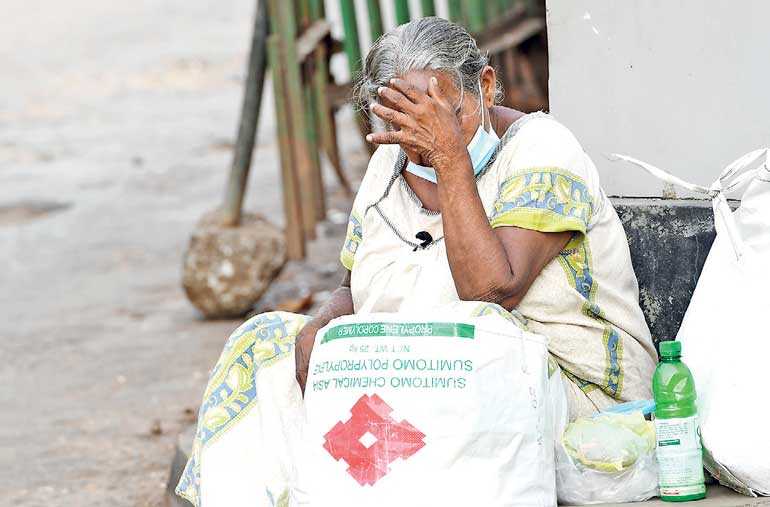Friday Feb 20, 2026
Friday Feb 20, 2026
Tuesday, 5 May 2020 00:44 - - {{hitsCtrl.values.hits}}

Despite all the relief measures, it is difficult to deliver economic relief to the poor and particularly the unemployed and self-employed. This because Samurdhi is not properly targeted. Some persons who deserve help have no access to these income transfers while others with high income get Samurdhi funds. The issue needs to be addressed in our future programs to help the deserving poor – Pic by Shehan Gunasekara
There is little doubt that COVID-19 will have a substantial economic impact on the Sri Lankan economy. This impact will include direct reduction in output due to the loss of working days and the necessary social distancing to prevent the spread of the virus, medical expenses to deal with persons who have been infected and expenses to prevent greater infections of those who are both vulnerable and not prepared to follow the instructions with respect to the necessary social distancing.
While there will be an immediate effect on incomes, there will be medium and long term effects following from policies used to prevent the spread of the virus. Where the rate of infections is concerned, so far, we have done well. The issue is whether we can maintain the preventative system that has been put in place with the deployment of large number of police and armed forces personnel.
This shock to the economy is larger and perhaps deeper than those we have encountered with the Global Financial Crisis (2008-2012). There was a limited effect of that crisis since our main exports markets USA, UK and the European Union experienced reductions in their GDP growth rates. The Easter Sunday bombings had a strong impact on our tourism industry from which we had not fully recovered when COVID-19 19 struck. But effect was relatively small and confined to one sector.
The initial conditions
When COVID-19 struck we were already in an economically weak position. Our GDP growth rate was 2.6% in the first half of 2019 with the impact of COVID-19, a recovery to our average growth rate (average for three decades of 4%) will be difficult to be achieved in the coming three to five years without substantial reforms and large inflows, particularly FDI.
Earnings from tourism are substantially low after the 2018 Easter Sunday bombings. The immediate future for tourism does not look good. Our exports have not risen enough to help with the current account in the balance of payments. Meanwhile our foreign exchange reserves have remained low at around $ 7.0 billion including a part of borrowed funds. Finally, we have to meet large debt repayments around $ 16 .0 billion in the coming four years 2020-2023.
Economic impact of COVID-19
We can expect a substantial economic impact of the spread of virus, both directly and indirectly, the latter being more important than the former. Direct impact given is that to date labour is in virtual quarantine. Measures to prevent the spread of the virus will cost funds that have not been budgeted before. And, the relief measures will cost more.
There needs to be a special allocation of funds for them. Looking at the experience of other countries these infections will increase but if we follow proper protocols our infections will remain low, particularly through social distancing. We can mitigate their impact by proper procedures to provide access to medical services for prevention and treatment. Greater testing and relying on trained epidemiologists would help.
The direct cost of the virus on the economy arises from the reduction in output given that production in all the sectors has virtually come to a full stop, only to increase in areas where the curfew has been withdrawn. But most workers are from the highly populous three areas of Colombo, Gampaha and Kalutara and are still in their homes.
In terms of national income – wages, profits and interest incomes will remain low in the near term. This makes for much needed policies for recovery. While we deal with the emergency, we have to think beyond the near term for proper policies. Measures taken for this emergency situation will have effects on the medium term and long term.
Government programs to mitigate impact of COVID-19
The Government has proposed a full list of relief measures. These include:
(a) Grace periods for the payment of income tax. And VAT, for driving licence renewals, paying water bills, and assessment of taxes less than Rs. 15,000, monthly credit card bills of less than 50,000 given and extension of until 30 April.
(b) Suspend leasing loan payments of three-wheelers for six months.
(c) No recovery of loan payments from Government and private sector employees until 30 May.
(d) Suspension of repayments of personal loans less than Rs. 1 million.
(e) Rs. 20,000 allowance to be paid to graduates chosen to follow training.
(f) Agrahara insurance benefits for health workers involved in prevention activities and civil security personnel are to be doubled.
(g) Six-month debt moratorium to be granted to tourism and apparel SMEs.
(h) Bank of Ceylon, People’s Bank, National Saving Bank, EPF and Employees Trust Fund are to jointly invest in Treasury bills and bonds to stabilise money market at 7% interest rate.
It is noteworthy that none of these measures are based on the price system. Most are based on directions, orders and quantitative measures.
Additional measures to provide relief include
(j) Maximum of 15% interest rate on credit card domestic transactions up to Rs. 50,000 and a 50% reduction in minimum monthly charges.
(k) All bank branches are to remain open during non-curfew hours.
(l) Ports, Customs and other regulatory bodies to issue essential food, fertiliser, pharmaceuticals and fuel to relevant individual continuously.
(m) Samurdhi beneficiaries and Samurdhi card holders be offered interest-free advances or Rs. 10,000 through Samurdhi Banks.
(n) Samurdhi Authority to issue title certificates to low income families immediately to issue nutritious food items.
(o) Exempting Sathosa and Cooperative Store from VAT and other taxes.
(p) A special account opened at BOC at the Presidential Fund to provide relief to health and social care. Rs. 100 million allocated. Provide rice, dhal and salt on a weekly basis. Tax and foreign exchange restrictions waived for domestic and foreign donors to contribute to the fund.
Despite all these measures, it is difficult to deliver economic relief to the poor and particularly the unemployed and self-employed. This because Samurdhi is not properly targeted. Some persons who deserve help have no access to these income transfers while others with high income get Samurdhi funds. The issue needs to be addressed in our future programs to help the deserving poor.
Other countries like Chile have such a system of income transfers based on detailed family and income data. A recent initiative by our Government to provide ration cards to those who are very poor and not recipients of Samurdhi will be helpful. But in the medium to long term we need to reform Samurdhi programme and target benefits to the deserving.
Meanwhile, the CBSL introducing import controls through credit restrictions which will create medium and long term distortions in the economy and lead to higher inflation. With these policies it signals a greater reliance on quantitative measures rather than use prices to manage the economy including a competitive exchange rate. When the price system is not used the quantities have to be allocated by an authority or a “czar” that breeds irrational allocations and corruption.
Conclusions
The measures proposed by the President are appropriate to address the short run situation created by COVID-19, especially on the consumption side. But complete shut-downs such as the closing of the private pharmacies is counterproductive to the maintenance of health standards of those who need daily doses of medicine like those who have diabetes, chronic heart disease and asthma. It was found feasible to relax control such as allowing private pharmacies to open.
However, since we are starting from an already weak initial conditions, the task is not easy. And, carries the danger of over-playing the hand of controlling the economy and extending the role of the Government in the economy. And, at times underplaying it, given that implementation of relief measure including income transfers depend heavily on the public service. It is not known to act efficiently and quickly.
Overplaying the hand of the Government carries with it the danger of bestowing additional and permanent power to the Government. We have seen the results of that experiment in the 1970-1977 period, with income ceilings, near 100% import controls restrictions on the transport of paddy. This overplaying of the hand of the Government led to disastrous results during that period. GDP growth rate fell, as did employment followed by a sharp reduction in living standards.
CBSL would do well to avoid direct quantitative measures to influence the volume of credit. It will reduce the flexibility of the economy to deal with the COVID-19 shock and signal its preference for quantitative measures including the management of reserves specially avoiding flexible and competitive exchange rates.
Direct measures could lead to a non-competitive economy, especially harmful for our export growth. Banning imports directly will create a bias against exports. We have to depend on incentive reforms to raise our GDP growth rate by raising productivity of the economy. What has been done in the short run may be necessary. But not it is not sufficient to ensure medium and long term growth.
(The writer is Chair, Academic Programme at Advocata Institute, an independent think tank, Colombo.)